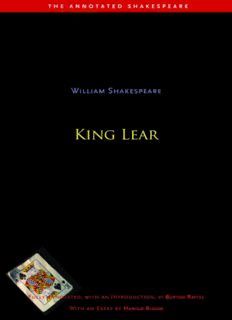
King Lear (The Annotated Shakespeare) PDF
Preview King Lear (The Annotated Shakespeare)
the annotated shakespeare King Lear William Shakespeare Edited, fully annotated,and introduced by Burton Raffel With an essay by Harold Bloom the annotated shakespeare Yale University Press • New Haven and London Copyright © 2007by Burton Raffel. All rights reserved. This book may not be reproduced,in whole or in part,including illustrations, in any form (beyond that copying permitted by Sections 107and108 of the U.S.Copyright Law and except by reviewers for the public press), without written permission from the publishers. Essay by Harold Bloom excerpted from Harold Bloom’s Modern Critical Interpretations,Wiliam Shakespeare’s King Lear,copyright © 1987. Designed by Rebecca Gibb. Set in Bembo type by The Composing Room of Michigan,Inc. Printed in the United States of America by R.R.Donnelley & Sons. Library of Congress Cataloging-in-Publication Data Shakespeare,William,1564–1616. King Lear /William Shakespeare ;edited,fully annotated,and introduced by Burton Raffel ;with an essay by Harold Bloom. p. cm.— (The annotated Shakespeare) Includes bibliographical references. isbn-13:978-0-300-12200-8(paperbound) 1. Lear,King (Legendary character)—Drama. 2. Inheritance and succes- sion—Drama. 3. Fathers and daughters—Drama. 4. Kings and rulers— Drama. 5. Aging parents—Drama. 6. Britons—Drama. I. Raffel, Burton. II. Bloom,Harold. III. Title. pr2819.a2 b55 2007 822.3(cid:2)3—dc22 2006036627 A catalogue record for this book is available from the British Library. 10987654321 For Ray Authement contents About This Book ix Introduction xvii Textual Note xxix Some Essentials of the Shakespearean Stage xxxi King Lear 1 An Essay by Harold Bloom 195 Further Reading 207 Finding List 213 about this book Abandoned to a raging storm,in act 3,scene 2,Lear speaks these memorable lines: Let the great gods, That keep this dreadful pudder o’er our heads, Find out their enemies now.Tremble thou wretch, That hast within thee undivulgèd crimes, Unwhipped of justice.Hide thee,thou bloody hand– Thou perjured – and thou simular man of virtue That art incestuous.Caitiff,to pieces shake, That under covert and convenient seeming Hast practiced on man’s life.Close pent-up guilts, Rive your concealing continents,and cry These dreadful summoners grace.I am a man More sinned against than sinning. This was perfectly understandable,we must assume,to the mostly very average persons who paid to watch Elizabethan plays.But who today can make full or comfortable sense of it? In this very fully annotated edition,I therefore present this passage,not in the ix
Description: